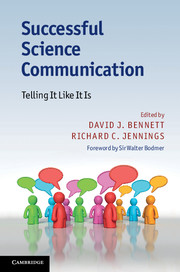Book contents
- Frontmatter
- Contents
- Foreword
- Authors' biographies
- Introduction Public engagement in an evolving science policy landscape
- Part I What it helps to know beforehand
- Part II Policy-makers, the media and public interest organisations
- Part III What you can do and how to do it
- Part IV And finally, evaluating and embedding science communication
- Index
- Plate section
Foreword
Published online by Cambridge University Press: 05 May 2013
- Frontmatter
- Contents
- Foreword
- Authors' biographies
- Introduction Public engagement in an evolving science policy landscape
- Part I What it helps to know beforehand
- Part II Policy-makers, the media and public interest organisations
- Part III What you can do and how to do it
- Part IV And finally, evaluating and embedding science communication
- Index
- Plate section
Summary
Foreword
The need for scientists to be able to communicate, and so engage with the public, is as important now, if not even more so, as it was when I chaired the Royal Society's ‘Public Understanding of Science’ committee in the mid-1980s. The final sentence of the Royal Society report was: ‘But our most direct and urgent message must be to the scientists themselves: Learn to communicate with the public, be willing to do so and consider it your duty to do so.’
Fortunately, the need for scientists to communicate is now widely recognised and no longer considered controversial by the scientific community. Indeed, it is now an accepted part of any scientist's activities and there is no longer any stigma for a scientist to be involved in the public communication of science.
- Type
- Chapter
- Information
- Successful Science CommunicationTelling It Like It Is, pp. xiii - xivPublisher: Cambridge University PressPrint publication year: 2011



